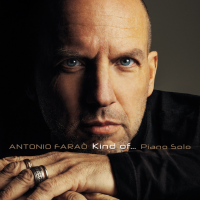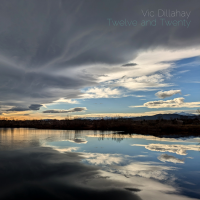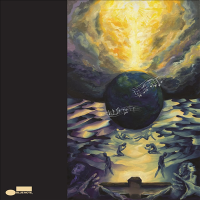Home » Jazz Articles » Album Review » Antonio Faraò: Kind of...
Antonio Faraò: Kind of...
His professional career, which began in the late '80s with collaborations with singer Mina and his first Italian quartet, made the intercontinental leap shortly thereafter, initiating what would become a spectacular series of ensembles under his leadership, in trio and quartet formats. These feature, among others, icons like Chris Potter, Joe Lovano and Jack DeJohnette. Despite the nearly constant rotation of personnel, Faraò maintains a remarkable formal homogeneity in his output, broken perhaps only on two radically different occasions: the first, the at times dark and oblique but highly inspired and delicately balanced Takes On Pasolini (CAM Jazz, 2005), which, with Miroslav Vitous and Daniel Humair, draws from film material—a recurring source of inspiration for the musician; and the second, the much later Antonio Farao-Eklektik (Warner Music Italy, 2017), a project in which he dramatically changes format and opens himself to other genres and approaches, once again accompanied by stellar sidemen.
It's hard to find any commentary or analysis of his pianistic style that does not mention Bill Evans, McCoy Tyner, Chick Corea and Herbie Hancock, the last being someone with whom he shares that stylistic breadth of vision that leads him to venture with confident ease into pop, funk or hip-hop territories. But the Milan-based keyboardist also displays indelible traces of his European colleagues, particularly certain French pianists (Martial Solal, Michel Petrucciani) as well as North American luminaries like Paul Bley or Jessica Williams. With the former, he shares, at times, those moments of dreamy yet intense introspection between the cerebral and the emotional, while with the latter, he shows similarities in emphasizing certain phrases in the altissimo register, through technically dazzling flourishes. In any case, Faraò eschews that aesthetic somewhere between circus-like and outlandish, foreign to circumspection and transcendence, which characterizes the work of a significant portion of his compatriots from the generation immediately before his—the many baby boomers associated, to varying degrees, with the sadly defunct Italian Instabile Orchestra. Instead, the artist's perspective is distinguished by an impeccably articulated formal seriousness— even when venturing into less orthodox terrain—in the manner of his fellow countrymen Enrico Pieranunzi, Giovanni Mirabassi or Massimo Farao, with whom he shares, besides his surname and instrument, his birth year—but beyond that, not much in terms of style.
Kind Of... draws from the pianist's conceptual and stylistic constants, already evident in his early albums, but skillfully refined here: that relentless determination in attack, those lightning incursions into his instrument's highest register, that taste for ambidextrous complexity taken almost to its limit. A brilliant technique with which he tackles material—mostly original—served with luxuriant harmonic and melodic imagination, and through which he pays homage to multiple sources of inspiration. But this time, undoubtedly a challenge any accomplished pianist longs to confront, he displays a special attention to dynamics, silence and space, while restraining his occasional tendency to deliver extended solos. Faraò also exhibits an expressive depth that some voices have previously criticized as nearly nonexistent, compressed into unusually short timeframes for what his developments typically entail. He is helped by an excellent recording that enhances the physicality of his fingerings, restoring to the piano its status as a percussion instrument, which it shares with string and keyboard categories.
The album opens with "There Will Never Be Another You," beginning in deconstruction, very much à la Solal. While unusual moderation characterizes this approach— something that will recur throughout the record, with logical exceptions—rhythmic-harmonic insertions update Harry Warren's venerable theme. Similar influences and methods converge in "Round Midnight," which avoids obviousness in its opening moments, and though it quickly becomes recognizable, it by no means renounces multiple permutations in its treatment. Another marked imprint on Faraò, the aforementioned Bley, appears unequivocally in "Around," a piece signed by the Italian that distills an atonal air without actually being so. The landscape becomes intricate but without turning abstruse, aided by iron-clad rhythmic control: undoubtedly, the Montreal-born would approve, taking a deep puff on his pipe.
Something similar occurs with "My Blues," with momentary reminiscences of John Coltrane's "Bessie's Blues," (from his classic quartet with Tyner) in which the pianist unleashes his overwhelming inventiveness, with magnificent runs from his right hand and a left that demands exclusive attention, culminating in a resounding finale. Tyner is further honored in the unmistakable "M.T.," a composition present on the earlier referenced Tributes, but here Faraò seems to direct his gaze toward the Philadelphia genius's more Africanist period, as if investigating, in a lengthy intro, the endless possibilities of a "Caravan" that never resolves. It is a superb conception and execution that, in a blindfold test, would challenge the maestro's most profound aficionados.
As stated before, there are numerous moments when density and dexterity give way to lyricism and emotional uninhibitedness. Three consecutive tracks establish a mood colored with intense cool tones. The first salutes, right from its title, to his admired Evans, one of jazz's most equivocal personalities. "Kind Of...," a beautiful original piece, recreates the Plainville pianist's musical ecosystem without falling into mimicry, accentuated by filigrees no less captivating for being precious, followed, once again, by a stellar ending. Alongside it, a melancholic revisitation of Chico Buarque's "O Que Será" presents a haunting emotive development, and "Pina" completes this trilogy of introspection and expressive nakedness, with Faraò questioning himself with undisguised sadness over a suggestive harmonic progression. But there's still space to evoke other types of feelings in the listener. There it is—the joyous celebration of "Gospello," which, in an undeniable Keith Jarrett vein (from the '70s), seems to display—not so much the religious sentiment clearly present in its author—as a passionate reencounter with springtime sensuality. Or the endearing swing echoes of "I Didn't Know What Time It Was," dominated by a seductive rhythmic structure over which Faraò projects substantial phrases with his right hand. Equally remarkable, prolonging that vibe somewhere between soulful and festive, is the delightful "Ballad for Four," an original composition previously captured with Didier Lockwood's quartet on the increasingly impressive Open Doors (Okeh, 2017), which suggests a lilting waltz tempo. Finally, the disc closes with soft cushioning—a restorative miniature again in Evans mode: "Sulle Nuvole."
Faraò's new album is both a fantastic gateway to his discography for those unfamiliar with his trajectory and a pleasant and long-overdue surprise for his most faithful followers, who will discover a new, necessary facet of his artistry. The final sensation, after several listens, is that nothing on this release is discordant or superfluous, and that the musician has successfully crowned a new peak in his extensive journey. Kind Of... is a work of maturity, in which he skillfully balances his enormous technique and creativity between inner reflection and interpretive apotheosis. His fertile imagination enables him to find, with apparent ease (the disc was recorded in a single six-hour session), exuberant, fresh ideas illuminating old tunes that have been explored thousands of times. He also invokes, through new themes, some of the most representative figures of modern jazz piano, that is, from the '60s to the present. As always, listeners versed in all that immense musical heritage will have a certain advantage from the starting line, but this doesn't mean at all that those unfamiliar with those distant latitudes won't enjoy it. And attention: his more crossover sympathizers shouldn't worry, since the Italian continues touring, presenting his Eklektik, and already has in mind a second installment. Whether in contemporary post-bop format, with sonic tints for a glamorously lounge atmosphere seasoned with socialites, or, like this latest offering, in an intimate mode designed not just for connoisseurs, the continuity of the celebration is assured.
Track Listing
There will never be another you; Kind Of…; O che Sera; Pina; Around; MT; Ballad for Four; Round Midnight; Gospello; I Didn’t Know What Time It Was; My Blues; Sulle Nuvole.
Personnel
Antonio Faraò
pianoAlbum information
Title: Kind of... | Year Released: 2025 | Record Label: Notes Around AG
Tags
PREVIOUS / NEXT
Support All About Jazz
 All About Jazz has been a pillar of jazz since 1995, championing it as an art form and, more importantly, supporting the musicians who make it. Our enduring commitment has made "AAJ" one of the most culturally important websites of its kind, read by hundreds of thousands of fans, musicians and industry figures every month.
All About Jazz has been a pillar of jazz since 1995, championing it as an art form and, more importantly, supporting the musicians who make it. Our enduring commitment has made "AAJ" one of the most culturally important websites of its kind, read by hundreds of thousands of fans, musicians and industry figures every month.
























